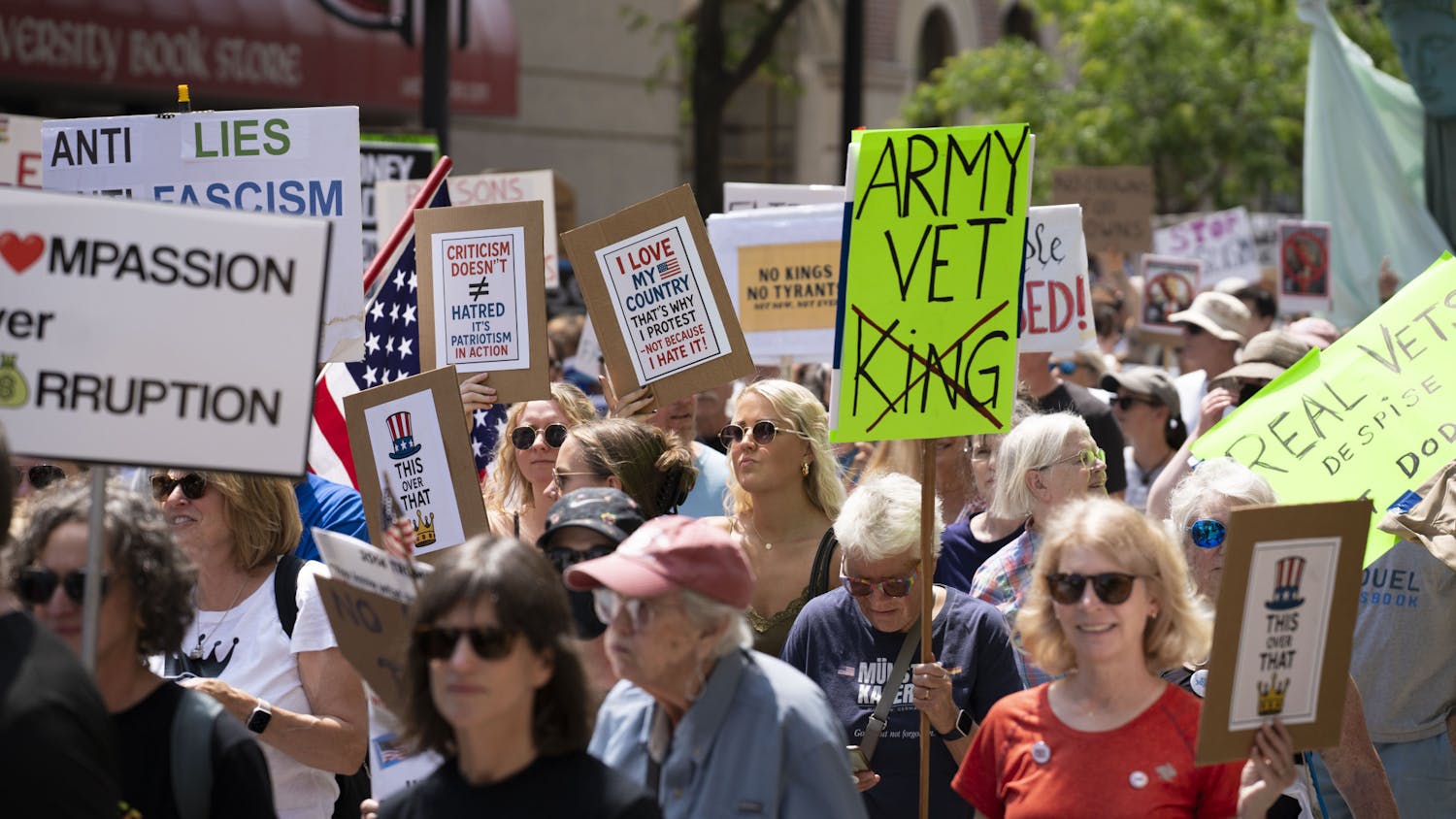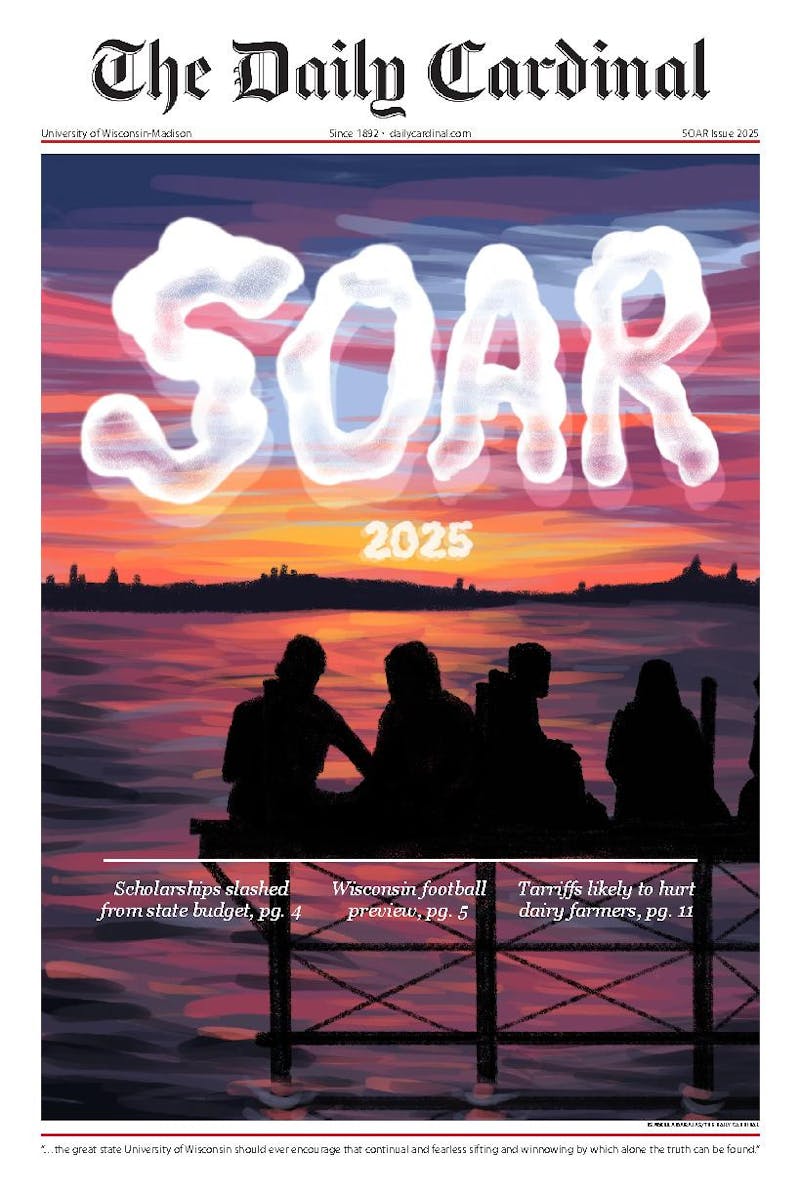1. #TheRealUW reveals campus climate
Reports of hate and bias flooded social media feeds under the #TheRealUW throughout the semester following several high-profile official reports of discrimination in the beginning and middle of March.
Two of the most prominent incidents involved a Native American healing circle outside of Dejope Residence Hall being mocked on March 9 and a student being spat on and shoved in Sellery Residence Hall on March 12.
Following this, hundreds of students shared posts on Twitter and Facebook about their experiences on campus. Students raised awareness for #TheRealUW through several means, including bringing a banner that featured the hashtag and a Bucky Badger in a Ku Klux Klan outfit to political rallies when presidential candidates came to Madison.
The movement garnered national attention from media outlets such as BET, Buzzfeed and The Chronicle of Higher Education.
The student-led movement has prompted responses from several key university administrators on both social media and through official statements.
Chancellor Rebecca Blank announced four initiatives in a March 15 open letter to the campus community, and she called for students to submit proposals to improve the campus climate for students of color. More than a hundred students submitted proposals.
—Peter Coutu

2. Wisconsin rejects presidential front-runners for Sanders, Cruz
Wisconsin voters sent a message of disapproval to the presumptive presidential nominees of both parties on the April 5 primary.
For Democrats, stung by defeats doled out by Gov. Scott Walker, strident progressives and students rejected Hillary Clinton’s moderation in favor of Sen. Bernie Sanders.
Sanders held two campus rallies prior to the vote where students waited hours to catch a glimpse of the dogged socialist.
“I believe his message, he tries to speak for middle class … and so I feel his support,” Jessica Kleinert said outside Sanders’ packed Orpheum rally.
In the GOP race, Donald Trump’s march to the nomination hit a snag as Milwaukee talk radio hosts and Walker signaled support of Sen. Ted Cruz.
Trump’s loss was not for a lack of trying. He crisscrossed the state, finding traction among struggling blue collar whites desperately gambling that through sheer force of personality alone Trump can revive Wisconsin’s rusted out industrial core.
“Trump’s gonna bring his negotiators and tell [Mexico] flat out if you can’t do business with us at this cost we’re not gonna sell you nothing,” John Bly said at a Janesville rally. The former employee of a car seat supplier for the city’s shuttered G.M. plant added with anger, “[NAFTA] put us out of a job.”
—Lucas Sczygelski

3. Regents pass three tenure resolutions
The UW System Board of Regents passed three tenure policy resolutions at its March 10 meeting amid systemwide backlash from faculty, who felt the resolutions failed to adequately protect academic freedom.
The regents looked for an immediate replacement for tenure policy after Gov. Scott Walker struck it from state statutes last July. The resolutions outline a variety of measures surrounding conditions for tenured faculty and procedures related to financial emergency or program discontinuance in which layoffs would be necessary.
Regent Tony Evers proposed an amendment in line with faculty suggestions that dealt with a specific line in one resolution, stating faculty layoff would only be an option in extraordinary situations where all other options have been considered.
Evers requested the word “considered” be replaced with “pursued,” to demonstrate a more active commitment to finding alternatives. The amendment was voted down, however, along with two others that he said would better protect academic freedoms.
Beth Lueck, president of the UW-Whitewater chapter of the American Association of University Professors, expressed concern that the policies were a result of pressures from outside the system.
“They’ve created a problem and now are trying to solve it this way,” Lueck said. “I don’t think it will strengthen education or the UW System, I think it will hurt it.”
—Madeline Heim
4. Arrest of student leads to class walkout
The UW-Madison Police Department arrested UW-Madison student Denzel J. McDonald, also known as King Shabazz, for 11 counts of graffiti on April 14.
A UWPD officer entered McDonald’s classroom and asked him to step out of the room; McDonald was arrested outside of the building. His belongings were taken as evidence and it is unknown at this time whether he will be able to graduate in May.
The arrest upset students, faculty and staff. A statement was signed by 500 individuals that called for “immediate action from administration.”
On the morning of April 21, approximately 400 students protested at various places on campus. They declared demands similar to the document.
Chancellor Rebecca Blank and UWPD Chief Susan Riseling released statements in which they apologized for the disruption and committed to reviewing the actions of the officer. Blank released another statement after the protest that acknowledged the demands and thanked students for “fighting for a better UW.”
—Sammy Gibbons

5. Immigration bills spark protest
Roughly 20,000 protesters crowded the Capitol in March, in a movement designed to show what a Wisconsin without Latinos would look like.
The “Day Without Latinos and Immigrants,” the biggest protest seen in the Capitol since rallies against Act 10 in 2011, was in response to two bills that the participants said were anti-immigrant.
One measure would have cut state funding from cities that don’t enforce immigration statutes in an effort to crack down on so-called sanctuary cities. After the protest, support surrounding the bill died after it failed to clear the state Senate.
The other bill, signed into law by Gov. Scott Walker last week, barred local governments from issuing their own forms of ID.
Businesses closed throughout Madison and dairy farmers in the state eased operations in solidarity with the movement. Protester Cerxio Guerrero said that most don’t understand the important role Latino workers play in the state’s economy.
“Our economy would be ruined [without Latinos],” Guerrero said. “[Latinos and immigrants] work jobs that others don’t want to.”
—Andrew Bahl

6. UW schools release effects of budget cuts
The UW System released reports from each campus April 11 that showed the implications of state funding cuts to their respective universities within the past year.
The reports detailed the elimination of certain faculty and staff positions, the decrease in funding for campus facilities and the reduction of resources available for students systemwide.
UW-Eau Claire and UW-Superior reported currently having zero reserves and UW-Madison reported having an amount of reserves that would allow the university to operate for less than one week.
According to the report, many university facilities are being affected by the budget cuts. UW-La Crosse’s Murphy Library was forced to eliminate many of its services during the 2015-’16 school year.
The report also showed a 10 percent decrease in employees at UW-Platteville and that 94.7 percent of UW-Stevens Point faculty members are now being paid less than the national average.
—Martha Morganstein
7. Year after Robinson’s death brings activism
Demonstrators marched all over Madison during the first weekend of March to commemorate the one year anniversary of the Madison Police Department shooting of Tony Robinson.
Protesters started the weekend by marching Friday, March 4 from Library Mall to the Overture Center for the Arts. Then Sunday, March 6—the anniversary of Robinson’s death—protesters gathered at the Social Justice Center and marched towards the Capitol. They also held a vigil that evening.
MPD Officer Matt Kenny shot and killed unarmed 19-year-old Tony Robinson after a physical altercation in 2015.
Robinson’s mother Andrea Irwin, in addition to Young Gifted & Black Coalition and BlackOut, attended the protests. Colorful banners read “Justice for Tony” and “Black Lives Matter.”
“If you sit there and say nothing, you are just as much guilty as those who are killing the babies in the streets. You have to use your voice to stand up. They have to make this stop,” Irwin said during the Sunday march. “It’s happened, and it will happen again.”
—Ellie Borstad and Miller Jozwiak

8. Legislature tries to fight student debt
State lawmakers took up an issue this session that debt-laden students have known about for years: the rising price of a college education.
Gov. Scott Walker touted a series of bills, passed by the state Legislature, that he says would keep college costs low. The measures included increasing technical college grants, requiring that colleges provide students with financial literacy information and creating a position in the Department of Workforce Development to help students find internships.
“Student loan debt has increasingly become a burden for young professionals,” Walker said.
State Democrats, however, favored a bill that would allow those holding student debt to refinance their loans. The so-called “Higher Ed, Lower Debt” bill received a hearing in the state Senate but did not move forward.
The minority party said Walker’s bills didn’t go far enough to address the problem.
“We should be doing something big, something bold,” said State Rep. Chris Taylor, D-Madison, during floor debate. “Not these peanuts … that don’t do what our students need.”
—Andrew Bahl
9. UHS budget increases by $1 million for next fiscal year
University Health Services will receive a $1.2 million budget increase for the next fiscal year as approved by Associated Students of Madison Student Services Finance Committee.
This increase will be used to expand mental health and sexual assault prevention services, which have seen increased demand in recent years.
A previous lack of funding resulted in wait times for mental health appointments around eight weeks.This increase will allow UHS to hire 12.5 new employees, which could add 6,000 more sessions to lower wait times.
UHS also plans to hire more staff of color, which is a concern of many students on campus.
There was some concern among SSFC members about approving the increase while keeping segregated fees affordable for students, but the committee ultimately felt the increase was worth supporting.
“If we can just make UHS the most accessible resource possible, that would benefit all students,” Representative Erin Harper said.
—Hannah Altwegg

10. BlackOut protests Board of Regents meetings
UW-Madison student group BlackOut continued their demonstrations on campus by protesting two more Board of Regents meetings during the Spring 2016 Semester.
The first of the semester occurred on Feb. 5. BlackOut was not allowed to hand in their demands to the regents, so they protested the meeting by yelling their demands.
The group also issued a new demand, their sixth. The group called for UW-Madison to remove mandatory standardized testing from the university’s application process as it impedes access for low-income and minority students.
BlackOut also protested the March 14 Board of Regents meeting, restating their demands. A UW-Madison student also detailed an incident of discrimination on campus where a Ho-Chunk elder was mocked during a Native American healing circle.
A recent Board of Regents meeting held in Green Bay announced a task force assigned with evaluating the campus climate for students of color, which satisfied one of the group’s demands, though it was not necessarily in response to BlackOut.
—Peter Coutu








